18 Years in Prison for “Et Cetera”
Why the FSB cannot manage any case without resorting to torture: on the appeals hearing in the Penza Network case
Yan Shenkman
Novaya Gazeta
September 3, 2020
Everything about the Network Case is seemingly clear. All of the defendants have been found guilty and sentenced to six to eighteen years in prison. Public support has subsided due to a fake news hit job against the defendants. The matter is closed, and you can switch with a clear conscience to other news items: Belarus, Khabarovsk, Navalny, and so on.
But why is it, then, that every time I come to Penza, inconspicuous-looking tough guys follow me around town? Why do the court bailiffs try their darnedest to close the formally open court hearings in the case to the public? Why, finally, was testimony given under torture removed from the case file? Are the authorities afraid?
Yes, they are afraid. Six months have passed, but the case is still a bugbear for the FSB.
 Photo courtesy of Sota.Vision and Novaya Gazeta
Photo courtesy of Sota.Vision and Novaya Gazeta
There are five pairs of handcuffs on the railing that separates us from the prisoners. They look like broken Olympic rings. They are for defendants Pchelintsev, Shakursky, Chernov, Kulkov, and Ivankin. The two other defendants, Kuksov and Sagynbayev, are sitting separately: they have tuberculosis.
The appeals hearing begins on a terribly dark note: the guys are told about the death of the Alexei “Socrates” Sutuga. Kuksov says, “That is beyond awful.” In the three years since they’ve been in police custody, a lot has happened, including the New Greatness case, the Ivan Golunov case, the Moscow case, the presidential “reset,” and, finally, the coronavirus. The context has changed completely. There is a photo in the case file of the defendants wearing black masks. It looks really scary. It would suffice to show it to laypeople for them to conclude the defendants were terrorists, of course. The court also thought so.
But now half the country goes around in masks, and it frightens no one.
In the 1930s, there were associations of former political prisoners in the USSR. Amid the turbulent events at the turn of the century, the old-style political prisoners appeared anachronistic. One war, two revolutions, another war, and rivers of blood had flowed since they had served time under the tsars for impertinence to their superiors, involvement in student political groups, and other nonsense. That government, just like this one, did not like students and those who were impertinent to their superiors. They put them in jail and beat them at demos. We remember how that whole story ended.
Pchelintsev says it outright: “We have been sacrificed.” Yes, they are classic victims of history.
 Dmitry Pchelintsev. Photo by Alexei Obukhov. Courtesy of Novaya Gazeta
Dmitry Pchelintsev. Photo by Alexei Obukhov. Courtesy of Novaya Gazeta
The first few hours of the hearing are spent on technical issues that, however, are not so technical. The numerous complaints filed by the defense lawyers boil down to the fact that the convicts were not given a good look at the case files and other documents from their trial nor allowed to voice their complaints. The court turns down all the defense’s motions and requests.
It’s as if court is saying, You don’t need to need what you’re in prison for. If you’re in prison it means that is how it has to be.
The defense’s complaints against the verdict can be divided into three parts.
1. The Witnesses
At the trial, the prosecution’s witnesses (!) did not confirm the veracity of their pretrial testimony. Some of the witnesses even disavowed it. Some admitted they had been pressured during the investigation. Some, it transpired, testified to what other people had told them. But the court was not in the least troubled by this fact: for some reason nothing bothers it at all.
That leaves the secret witnesses: there are six of them in the case. One of them, identified as “Kabanov,” is an experienced provocateur (Novaya Gazeta has written about him): this is not his first job for the security services. Another of them could not really explain what he had witnessed. Three of the witnesses claimed that the defendants had told them about their criminal plans after they had been arrested and remanded in custody, that is, in the remand prison in Penza.
Could this have happened? It’s unlikely, but let’s assume it is true. And yet these same “witnesses” could not even correctly describe the defendants’ physical appearance and the setting in which the conversation allegedly took place. Not to mention the fact that prisoners are always dependent. It is an easy matter for the authorities to put pressure on them, to frighten them, to force them to give the “right” testimony in court in exchange for better conditions.
Investigators put testimony obtained from the defendants under torture in the mouths of these witnesses. You get the feeling that they carried the transcripts of the interrogations around them and read them aloud to the first people they met.
Finally, there is the small matter that the transcripts of the interrogations do not match the videos of the interrogations. A person would literally say one thing in the transcript and another thing in the video recordings. The court looked at the videos, compared them with the transcripts, nodded, and everything was left as it was. There is no mention of these discrepancies in the verdict.
2. The Forensic Examinations
Almost all the investigation’s forensic examinations have been refuted by independent experts and specialists. Among the reasons cited by them are incompetence, bias, non-compliance with established standards, and even falsification. It is for falsifications in the Network Case that the Military Investigative Committee is now reviewing FSB Investigator Valery Tokarev. It is so obvious that even their own people don’t believe it.
Although the court claims that defense’s forensic examinations do not contradict the FSB’s forensic examinations, they actually do. None of the FSB’s forensic examinations passed the test, neither the computer examination, the linguistic examination nor the psychological examination.
We must give the court its due: it more often than not did enter findings and testimony that were unpleasant to the prosecution into evidence. But it did not evaluate them in any way and did not take them into account when rendering its verdict. There they are. Sure, qualified specialists have proven that the FSB’s forensic examinations are bullshit, and they can say so if they like. But this has no bearing whatsoever on the verdict.
3. Bias and Presumption of Guilt
Each letter of the verdict indicates that the court was biased in favor of the prosecution. The trial need not have taken place. The investigative case file and the court’s published findings are nearly identical. In fact, it was the FSB who tried the Network defendants, not the court. The court only signed off on their pre-ordained verdict.
As many people have heard, Russia has an independent judiciary.
And here is the icing on the cake, the culmination of this theater of the absurd: the Volga District Military Court that handed down the guilty verdict in the Network Case did not officially exist when the verdict was rendered. So, it is not clear exactly who tried the case.
 The Penza Network Case defendants during the trial. Photo by Alexei Obukhov. Courtesy of Novaya Gazeta
The Penza Network Case defendants during the trial. Photo by Alexei Obukhov. Courtesy of Novaya Gazeta
Let’s leave aside for a moment the FSB’s use of torture, the injustice of the case, and the court’s bias. Even if everything had been objective and impartial, from a legal point of view this is not a verdict, but the delirium of a madman. What does a sentence like the following tell us?
“The participants took clandestine security measures, as evidenced by the presence of aliases, communication on the internet using secure protocols, trips to other cities in passing vehicles, et cetera.”
A huge number of questions immediately come to mind.
Half of the people on the internet uses aliases (aka usernames). Are all of them involved in “clandestine security measures”?
Secure protocols are a feature, for example, of Telegram, which is used by half of the country, including government agencies. So, does this mean we should only use insecure protocols? Then the authorities should put an end to it, they should criminalize secure protocols and warn us not to use them.
No one has ever accused hitchhikers of using “clandestine security measures.” This is a game changer for criminology.
Finally, the “et cetera.” This was written by adults. How could “et cetera” be grounds for sentencing someone to eighteen years in prison? How could anyone write such nonsense in a verdict at all?
 The defendants communicate with their relatives. Photo by Alexei Obukhov. Courtesy of Novaya Gazeta
The defendants communicate with their relatives. Photo by Alexei Obukhov. Courtesy of Novaya Gazeta
Konstantin Kartashov, Maxim Ivankin’s lawyer: “I cannot call this document a verdict.”
Oxana Markeyeva, Dmitry Pchelintsev’s lawyer: “The verdict does not meet the procedural requirements.”
Translated into plain language, this means the judges did a poor job, a shabby job. If they had been building a house instead of writing a verdict, the house would have collapsed.
The reason for all these inconsistencies is simple: the guilt of the defendants was proved not in the course of the investigation, but in the course of torturing them. The FSB, however, were afraid to use this testimony, obtained under duress, although they would not admit to torturing the defendants. But without it, nothing sticks. Without it, the verdict is just a random pile of dubious evidence vouched for by the authority of Russian state security. The main thing you need to know about the case is that seven young men were sentenced to terms in prison from six to eighteen years, and their guilt was not proven in court. And this unproven guilt is a threat to all of us—not just to opposition activists, but to anyone walking down the street who catches the eye of FSB field agents.
There are so many problems with the verdict that it is impossible even to state all of them in one or two appeals hearings. There is little hope that the court will heed the arguments of the defense. There is an aura of hopelessness about the case. But it has to be brought to a close because a lot of things hang in its balance. After all, the verdict is based mainly on suspicion—on the fact that, hypothetically, the defendants could have “organized a terrorist community.” In theory, any of us could organize one. We are all under suspicion.
The lawyers in this case are not only defending Pchelintsev, Shakursky, Chernov, Kulkov, Ivankin, Kuksov, and Sagynbayev. They are also defending society, the right of each of us to be protected from the FSB. When they lose their appeal, they will keep going—to the European Court of Human Rights, to the Court of Cassation, to the Russian Supreme Court. Everyone involved in engineering this verdict should realize that they will inevitably have to account for their actions, and at the highest level. I don’t know about criminal responsibility, but universal disgrace is inevitable. They must answer for what they have done, and sooner or later they will answer for it.
Translated by the Russian Reader. Please read my previous posts on the Network Case (see the list, below), and go to Rupression.com to find out how you can show your solidarity with the other defendants in the case.
#NetworkCase
- “Jenya Kulakova: A Sunny Downpour,” 2 August 2020
- “Viktor Filinkov: The Big Picture,” 4 July 2020
- “We Can Dance If We Want To,” 22 June 2020
- “Come As You Are,” 21 June 2020
- “The Network Trial in Petersburg: Closing Statements by Defendants,” 18 June 2020
- “Parents Demand Release of Netfwork Defendants Due to Coronavirus,” 1 April 2020
- “Pornofilmy, ‘This Will Pass,’” 1 March 2020
- “At the Network Trial in Petersburg,” 25 February 2020
- “Yevgenia Litvinova: Stop the Crackdown in Crimea,” 18 February 2020
- “The Network Case in Context,” 12 February 2020
- “86 Years in Prison for 7 Defendants in Network Case,” 10 February 2020
- “Two Network Case Defendants Married in Prison,” 29 January 2020
- “Viktor Filinkov: ‘It’s As If You Disappear—Only the Pain Remains,’” 21 January 2019
- “David Graeber on the Network Case,” 20 January 2020
- “‘My Statement Has Been Recorded Accurately (February 1–3, 2020),” 28 December 2019
- “18 Years in Prison for Being Tortured by the FSB,” 26 December 2019
- “The Second Anniversary,” 20 October 2019
- “‘Hi, I’m Married,’” 14 August 2019
- “Ivan Davydov: The New Greatness Trial,” 12 July 2019
- “Guided Tour of a Torture Chamber,” 11 July 2019
- “They Are Who They Are,” 10 June 2019
- “Vocalese (The Network Trials),” 6 June 2019
- “Yana Teplitskaya: Can Torture Be Endured?” 3 June 2019
- “The Network Trials: Pinning the ‘Code’ on the Defendants,” 22 May 2019
- “My Generation,” 6 May 2019
- “Lie Still, Bitch!” 26 April 2019
- “Crossing Jordan: Day Three of the Network Trial,” 17 April 2019
- “Network Trial Begins in Petersburg,” 9 April 2019
- “FSB May Haved Used Neo-Nazi Provocateur to Frame Network Suspects,” 1 February 2019
- “Jenya Kulakova: A New Year of Sorts,” 18 January 2019
- “No Amnesty for ‘Terrorists,’” 15 January 2019
- “Relentless Repression in Russia: Why Londoners Are Demonstrating on January 19,” 14 January 2019
- “Solo,” 12 January 2019
- “Convoyed,” 31 October 2018
- “How the FSB Tortures Detainees: Stories of the Victims,” 28 October 2018
- “No Justice, No Peace: Petersburg’s Kangaroo Courts Revisited,” 21 October 2018
- “Shakursky and Pchelintsev Indicted for Organizing ‘Terrorist Community,’” 11 September 2018
- “Arman Sagynbayev: I Was Tortured by the FSB,” 8 September 2018
- “Yana Teplitskaya: Wonderland,” 6 September 2018
- “Network: Parents versus the FSB,” 2 August 2018
- “Is Maxim Shulgin an ‘Extremist’?” 26 July 2018
- “Moscow City Court Affirms Anna Pavlikova’s Remand in Custody,” 26 July 2018
- “Is Lydia Bainova an ‘Extremist’?” 24 July 2018
- “Anna Pavlikova: Enemy of the Putinist State?” 22 July 2018
- “A Funny Thing Happened in Pryamukhino,” 20 July 2018
- “Two More Suspects Detained in Network Case,” 6 July 2018
- “Petersburg Court Bailiffs Attack Reporter at Network Case Hearing,” 20 June 2018
- “Anna Tereshkina: At the Court Hearing,” 20 June 2018
- “Nikolai Boyarshinov: I Hope One Day We Can Say the FSB Has Been Banned,” 12 June 2018
- “Lemmy Kilmister vs. Vladimir Putin,” 19 May 2018
- “Brazil,” 18 May 2018
- “This Is What Antifascism Looks Like,” 13 May 2018
- “May Day in Petersburg: ‘Your Torture Won’t Kill Our Ideas,’” 2 May 2018
- “Riot Cops Raid Punk Rock in Barnaul: ‘Freaks, Not Patriots,” 29 April 2018
- “Hug Your Son and We’ll Open Fire,” 27 April 2018
- “Denis Lebedev’s Suicide Note,” 26 April 2018
- “‘Are You a Bitch Yet?’ FSB Makes New Threats to Framed and Tortured Antifascist Viktor Filinkov,” 26 April 2018
- “Suicide Invoice,” 25 April 2018
- “Zoya Svetova: Interview with Petersburg Public Monitoring Commission Members Yana Teplitskaya and Yekaterina Kosarevskaya,” 23 April 2018
- “TV Party Tonight!” 21 April 2018
- “Valery Pshenichny: Tortured, Then Murdered,” 19 April 2018
- “They Are Not Terrorists! The Terrorists at the FSB Torture People,” 16 April 2018
- “FSB and NTV Pressure Mother of Man Accused in ‘Terrorist’ Frame-Up,” 12 April 2018
- “A New Face in Hell: Yuli Boyarshinov,” 12 April 2018
- “Wife of Tortured Antifascist Seeks Asylum in Finland,” 11 April 2018
- “The FSB’s Tall Tales,” 10 April 2018
- “Families of Penza-Petersburg Terrorists Form Committee,” 9 April 2018
- “Extremism Inside Out,” 30 March 2018
- “Search and Intimidate,” 29 March 2018
- “Solidarity? (The Case of the Penza and Petersburg Antifascists),” 24 March 2018
- “Anna Tereshkina: At Viktor Filinkov’s Remand Extension Hearing,” 23 March 2018
- “Ping, Ping, Ping: The Remand Extension Hearing of the Penza ‘Terrorists,’” 20 March 2018
- “Tortured Petersburg Antifascist Viktor Filinkov Transferred to Remand Prison in Leningrad Region,” 17 March 2018
- “Svyatoslav Rechkalov: ‘They Proceeded to Pull Down My Trousers, Threatening to Shock Me in the Groin,’” 15 March 2018
- “They Jump on Anything That Moves, Part 3: The Case of the New Greatness Movement,” 15 March 2018
- “The Horrorshow Continues: Svyatoslav Rechkalov Tortured in Moscow,” 15 March 2018
- “The Rowdies Have to Be Apprehended Legally, So We Can Have a Celebration in the City on March 18, not Bedlam,” 15 March 2018
- “Ilya Kapustin: ‘When the Stamp Thudded in My Passport, It Was Like a Huge Weight Had Been Lifted from My Shoulders,’” 13 March 2018
- “Your Husband Safely Made the Flight to Minsk after We Abducted Him in Petersburg,” 2 March 2018
- “‘FSB Officers Always Get Their Way!’” 28 February 2018
- ‘The Case of the Anarchists: Disappearances, Torture, Frame-Up (11 AM, February 15, 2018, Moscow),” 14 February 2018
- “The Strange Investigation of a Strange Subway Attack,” 12 February 2018
- “Arrested Penza Antifascists Talk about Torture in Remand Prison,” 10 February 2018
- “Solidarity with Persecuted Russian Antifascists and Anarchists in NYC and Minneapolis,” 7 February 2018
- “Ilya Kapustin: ‘They Said They Could Break My Legs and Dump Me in the Woods,’” 31 January 2018
- “The Penza ‘Terrorism’ Case,” 30 January 2018
- “Breaking Bad with the FSB,” 29 January 2018
- “How ‘Stability’ Has Really Been Achieved in Russia,” 29 January 2018


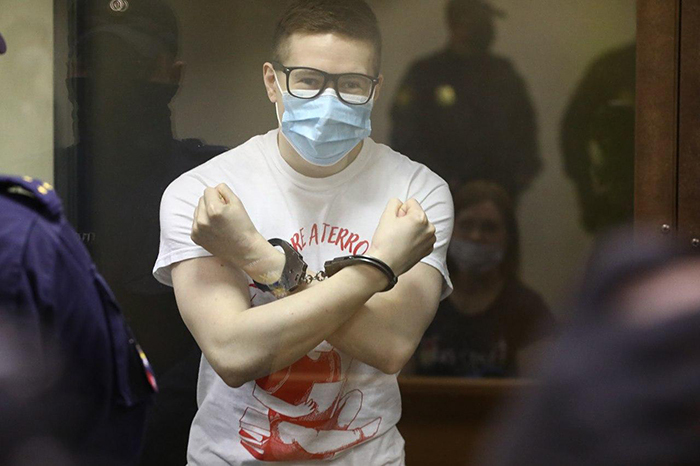
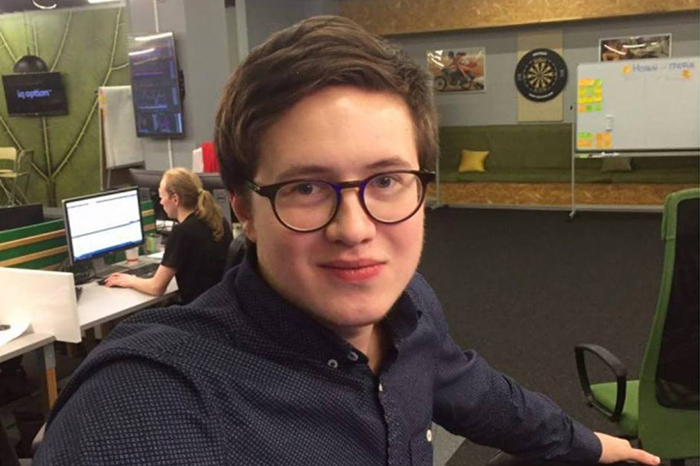 Viktor Filinkov at work. Photo courtesy of Rupression
Viktor Filinkov at work. Photo courtesy of Rupression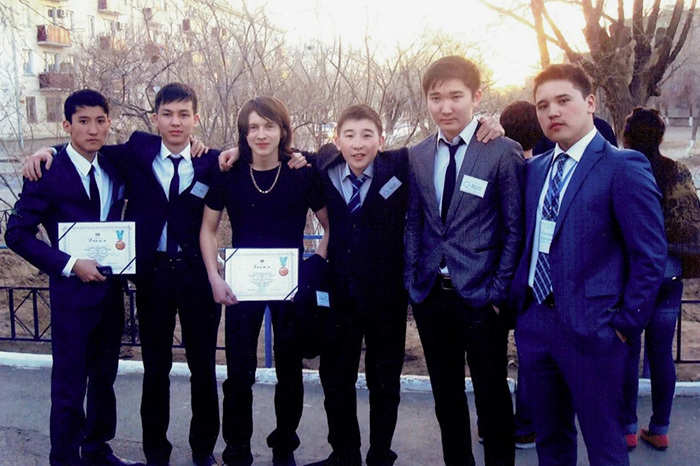 Viktor Filinkov (third from left) with schoolmates in Kazakhstan. Photo courtesy of Mediazona
Viktor Filinkov (third from left) with schoolmates in Kazakhstan. Photo courtesy of Mediazona Viktor Filinkov in happier times. Photo courtesy of Rupression
Viktor Filinkov in happier times. Photo courtesy of Rupression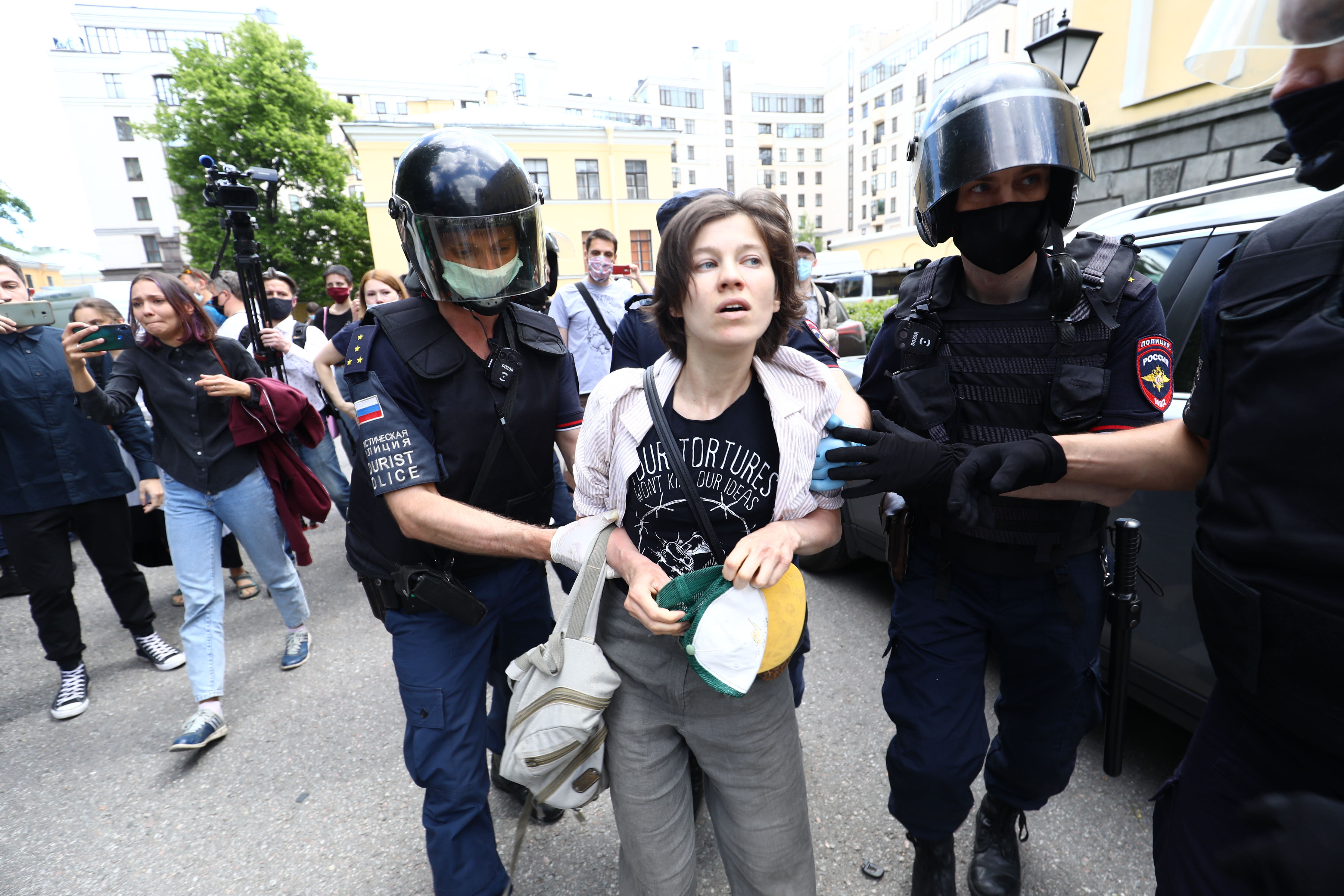 Police detain a demonstrator outside the courthouse in Petersburg where Filinkov and Boyarshinov were sentenced on June 22, 2020. Photo by David Frenkel, Mediazona
Police detain a demonstrator outside the courthouse in Petersburg where Filinkov and Boyarshinov were sentenced on June 22, 2020. Photo by David Frenkel, Mediazona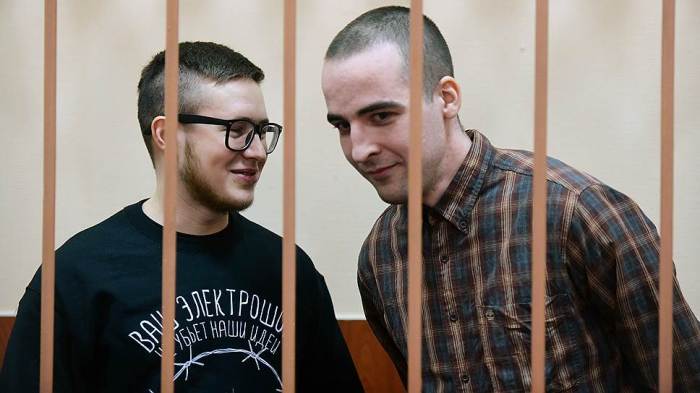 Filinkov and Boyarshinov at a court hearing in 2018
Filinkov and Boyarshinov at a court hearing in 2018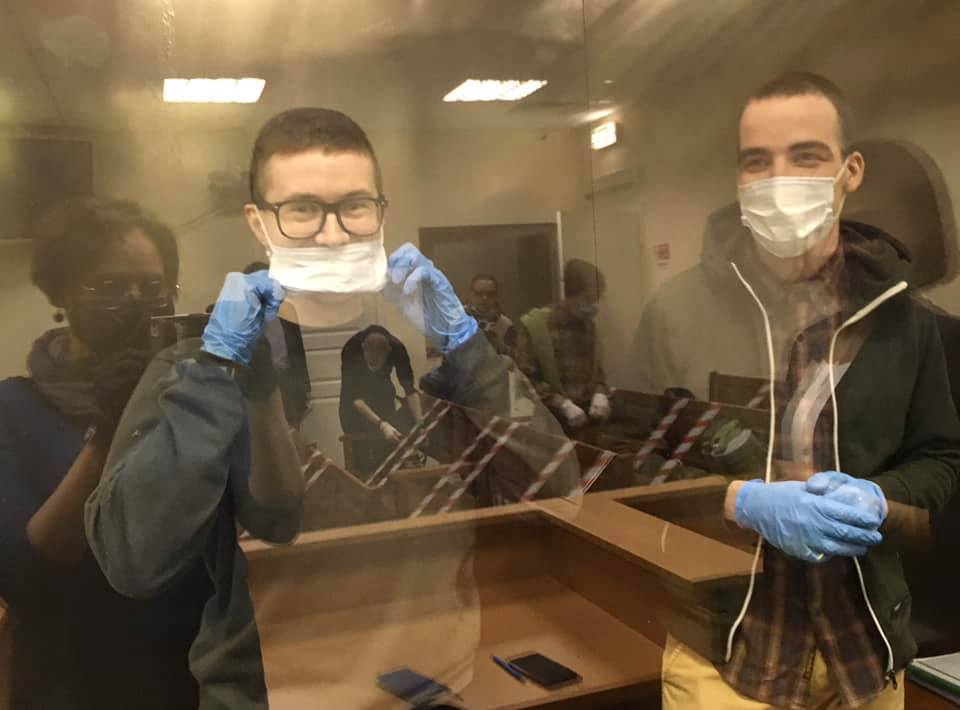 Public defender Jenya Kulakova (left) photographs Network Case defendants Viktor Filinkov (center) and Yuli Boyarshinov. Courtesy of Jenya Kulakova
Public defender Jenya Kulakova (left) photographs Network Case defendants Viktor Filinkov (center) and Yuli Boyarshinov. Courtesy of Jenya Kulakova
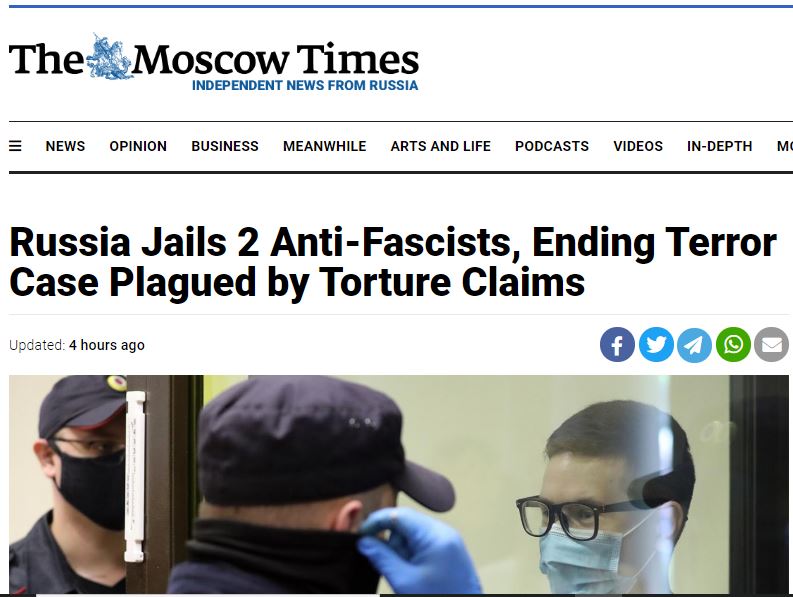




 “Stalinist prison sentences. Crimean Tatars: 7, 8, 12, 12, 18, 19 years. Network Case: 6, 9, 10, 13, 14, 16, 18 years. Coming soon to a location near you!” Photo by Yevgenia Litvinova
“Stalinist prison sentences. Crimean Tatars: 7, 8, 12, 12, 18, 19 years. Network Case: 6, 9, 10, 13, 14, 16, 18 years. Coming soon to a location near you!” Photo by Yevgenia Litvinova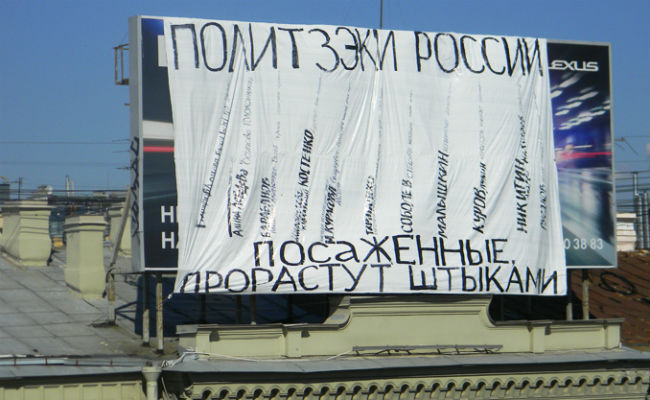 “Russia’s political prisoners: the jailed will sprout up as bayonets.” A banner hung over Nevsky Prospect in Petersburg by the Pyotr Alexeyev Resistance Movement (DSPA) in August 2012. Photo courtesy of
“Russia’s political prisoners: the jailed will sprout up as bayonets.” A banner hung over Nevsky Prospect in Petersburg by the Pyotr Alexeyev Resistance Movement (DSPA) in August 2012. Photo courtesy of  Anastasia Pchelintseva and Anna Shalunkina after their weddings to Dmitry Pchelintsev and Maxim Ivankin. Photo courtesy of 7×7 and Novaya Gazeta
Anastasia Pchelintseva and Anna Shalunkina after their weddings to Dmitry Pchelintsev and Maxim Ivankin. Photo courtesy of 7×7 and Novaya Gazeta